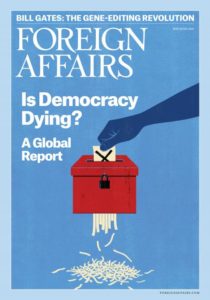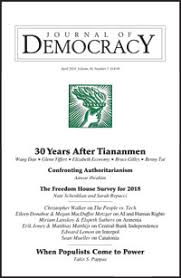 Experts play valuable and highly visible roles advising leaders in wealthy liberal democracies and international institutions. But far less is known about what they do—and to what effect—for authoritarian regimes and developing countries, notes Calvert W. Jones, an Assistant Professor in the Department of Government and Politics at the University of Maryland, College Park. That’s a problem, because autocratic leaders from China to Saudi Arabia increasingly rely on experts, especially from top consulting firms, universities, and think tanks in the West, she writes for Foreign Affairs:
Experts play valuable and highly visible roles advising leaders in wealthy liberal democracies and international institutions. But far less is known about what they do—and to what effect—for authoritarian regimes and developing countries, notes Calvert W. Jones, an Assistant Professor in the Department of Government and Politics at the University of Maryland, College Park. That’s a problem, because autocratic leaders from China to Saudi Arabia increasingly rely on experts, especially from top consulting firms, universities, and think tanks in the West, she writes for Foreign Affairs:
In 2017, the consulting market in the Gulf monarchies topped $2.8 billion, with Saudi Arabia accounting for almost half of that amount, according to Source Global Research. Experts and the institutions they work for have sometimes appeared unprepared to handle the potential pitfalls of operating in authoritarian contexts. ……Leaders enlisting outside experts is hardly a new phenomenon. But the depth of expert involvement with authoritarian regimes is growing, along with the range of areas in which such experts consult.
Organizations that provide expert advice should reveal more about the clients they take on, the work they do, and the outcomes they achieve, as well as the obstacles they encounter, she adds, in an essay adapted from her article “Adviser to the King: Experts, Rationalization, and Legitimacy,” World Politics, January 2019.
 Globalized authoritarian regimes are increasingly abusing Interpol’s notice system to go after political opponents based abroad, says analyst Edward Lemon. These regimes seek not only to punish their critics, but also to legitimate their own acts of repression, he writes in Weaponizing Interpol, an article for the National Endowment for Democracy’s Journal of Democracy:
Globalized authoritarian regimes are increasingly abusing Interpol’s notice system to go after political opponents based abroad, says analyst Edward Lemon. These regimes seek not only to punish their critics, but also to legitimate their own acts of repression, he writes in Weaponizing Interpol, an article for the National Endowment for Democracy’s Journal of Democracy:
Those targeted face the risk of arrest if they travel across borders; have difficulties obtaining visas and open bank accounts; and suffer reputational damage. Interpol remains opaque and lacks accountability for its actions. Recent reforms have started to address some of these issues. But more needs to be done to prevent the hijacking, repurposing, and weaponizing of Interpol by today’s globalized authoritarian regimes.







